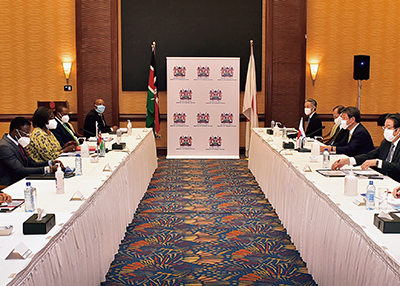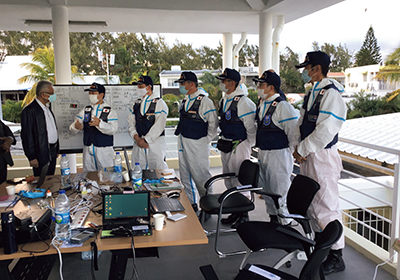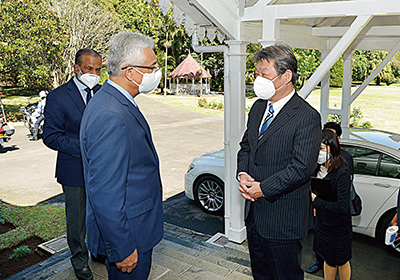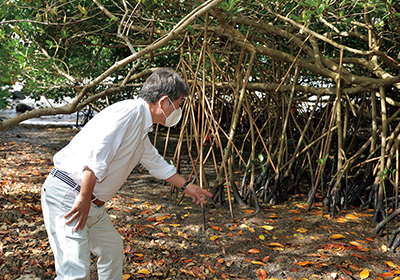Diplomatic Bluebook 2021
Chapter 2
Japan's Foreign Policy by Region
2 East Africa
(1) Uganda
Under President Yoweri Museveni's long-serving administration since 1986, Uganda has enjoyed sustained economic growth owing to its stable domestic politics, and has contributed to regional stability as a major actor in East Africa. Uganda also actively accepts refugees, including South Sudanese refugees staying in the northern part of the country.
Following the damage caused by desert locusts, Japan provided Emergency Grant Aid of approximately 66 million Japanese yen through the United Nations World Food Programme (WFP) in June.
(2) Ethiopia
Ethiopia, which has the second largest population in Africa (110 million people), holds an important position in African politics, serving as the location of the African Union (AU) headquarters. It also recorded a solid economic growth rate until 2019. In March, in response to the damage from desert locusts, about 3.3 billion yen was provided for food assistance through the WFP.
In April, as COVID-19 spread, Japan requested support from the Ethiopian government, and Japanese nationals residing in African countries were able to leave Africa through Ethiopia via flights on Ethiopian Airlines (see the Opening Special Feature on page 2). During a summit telephone call with Prime Minister Abiy Ahmed that month, Prime Minister Abe expressed his gratitude for Ethiopia's support for the repatriation of Japanese nationals.
(3) Kenya
Kenya plays a central role in the regional economy with its port of Mombasa, the largest port in East Africa, serving as a gateway to East and Central Africa. Kenya also contributes to the peace and stability of the region as a stabilizing force in East Africa by its efforts including its engagement in peacebuilding in Somalia, South Sudan, and elsewhere. Under the leadership of President Uhuru Kenyatta, the Kenyan economy has achieved solid growth in recent years but has been hit hard by the spread of COVID-19 and lockdown measures. In March, Japan provided Emergency Grant Aid for food assistance of approximately 396 million Japanese yen through the WFP in response to the damage caused by desert locusts.
At the Japan-Kenya Foreign Ministers' Meeting held in France in October, the Ministers exchanged opinions on cooperation for realizing universal health coverage and coordination for TICAD8. In January 2021, Foreign Minister Motegi visited Kenya and paid a courtesy call to President Kenyatta and met with Foreign Minister Raychelle Awuor Omamo and Cabinet Secretary for Sports, Culture and Heritage Dr. Amina Mohamed.
 Japan-Kenya Foreign Ministers' Meeting
Japan-Kenya Foreign Ministers' Meeting(January 13, 2021, Nairobi, Kenya)
(4) Union of the Comoros
Union of the Comoros is an island nation located in the Indian Ocean and its long-standing political instability and agricultural-based economy affected by climatic conditions have become obstacles to economic growth and social development. In January, Secretary of State in charge of Cooperation at the Minister of Foreign Affairs and International Cooperation Dr. Takiddine Youssouf visited Japan to meet with Parliamentary Vice-Minister for Foreign Affairs Nakatani Shinichi.
(5) Djibouti
Djibouti, situated at one of the great trade arteries that pass through the Indian Ocean and connects Europe and Asia, is aiming to be a regional distribution hub. It is a base for international security and is also a key country in achieving a “Free and Open Indo-Pacific.” Since 2011, Djibouti has been hosting the facility of Japan Self-Defense Forces to carry out Japan's counter-piracy operations, and the two countries have been developing an excellent relationship.
In August, the two countries exchanged notes concerning grant aid to expand access to basic education and improve school environment, with a maximum grant limit of 2.092 billion yen.
(6) Sudan
Sudan is the second largest country by area in Sub-Saharan Africa, and is blessed with crude oil, minerals, as well as water resources and fertile arable land from the Nile River. The country has potential for economic development, but its development has been hampered by a long civil war totaling about 40 years since independence. In April 2019, the Bashir administration, which had been in power for 30 years, collapsed. In August, a new provisional government based on power sharing between the armed forces and the people was established. The new provisional government has prioritized a complete end to the civil war, and in October 2020, signed a peace agreement with the Sudan Revolutionary Front. In addition to the agreement to normalize diplomatic relations with Israel, relations with the international community are improving significantly, such as the resumption of support from international financial institutions following its removal by the U.S. from the list of state sponsors of terrorism. The international community has welcomed the changes in Sudan, and the Sudan Partnership Conference was held in Berlin in June, with State Minister for Foreign Affairs Suzuki Keisuke participating from Japan online. At the conference, each country announced its support for Sudan totaling 1.8 billion US dollars.
(7) Seychelles
Although Seychelles has the highest gross national income per capita (GNI) of 16,900 US dollars (2019) in Sub-Saharan Africa, it is a small island country with vulnerabilities in fields such as climate change and disaster prevention.
At the end of October, presidential and national assembly elections were held peacefully, with the opposition candidate Wavel Ramkalawan winning with 54.9% of the vote, with the opposition Seychelles Democratic Alliance party, headed by Ramkalawan, taking 25 out of 35 seats. It is the first democratic election in the history of Seychelles' internal affairs that has led to a change of government since the 1977 coup d'état.
(8) Somalia
In Somalia, the federal government was officially reestablished in 2012 for the first time in 21 years, but Somalia is still in the process of building a country due to the humanitarian crises, such as droughts and floods, as well as continuing activities by the terrorist organization Al-Shabaab.
In March, Japan provided food assistance of about 341 million Japanese yen through the WFP following damage from desert locusts.
(9) Madagascar
Madagascar is an island country situated at the gateway to eastern and southern Africa, which celebrated its 60th anniversary of independence in 2020. Japan is supporting the project to extend Toamasina Port, the country's largest port, with an ODA yen loan, as one of the key countries to realize a “Free and Open Indo-Pacific.”
In July, Japan exchanged notes with Madagascar concerning grant aid through the Food and Agriculture Organization (FAO) of the United Nations, which contributes to improving children's nutrition and health services. On the economic front, investments by a Japanese company is contributing to the Madagascar's economy with the integrated production of nickel and cobalt ores, which is the largest mining investment in Africa.
(10) South Sudan
Turmoil has continued in South Sudan since the clashes in the capital, Juba, in December 2013. Mediation efforts by the Intergovernmental Authority on Development (IGAD) are ongoing. After the second clashes in July 2016, the Khartoum Declaration of Agreement between parties of the conflict of South Sudan was issued in June 2018, and President Kiir, former first Vice President Machar, and others signed the Revitalized Agreement on the Resolution of the Conflict in South Sudan in September 2018. The establishment of the Transitional Government of National Unity was realized only in February 2020, after being postponed twice in May and November 2019. Future important challenges in domestic affairs include reform of the security sector (integration of the national army and opposition forces), reconstitution of the Transitional National Legislative Assembly, establishment of a new constitution, and holding presidential elections at the end of provisional period.
(11) Mauritius
Mauritius is an island country at the center of marine transportation on the Indian Ocean, and is one of key countries for realizing a “Free and Open Indo-Pacific.”
From August to September, Japan dispatched Japan Disaster Relief (JDR) Expert Teams in response to an oil leakage off the coast of the country. In December, Foreign Minister Motegi visited Mauritius for the first time as Japan's foreign minister and met with Prime Minister Pravind Jugnauth and Minister of Foreign Affairs, Regional Integration and International Trade Nandcoomar Bodha. Foreign Minister Motegi inspected the extent of the damages from the oil spill and the status of recovery (see the Special Feature on page 167).
 Visit to the JDR team by Prime Minister Jugnauth (August 13, Blue Bay, Mauritius; Photo: JICA)
Visit to the JDR team by Prime Minister Jugnauth (August 13, Blue Bay, Mauritius; Photo: JICA)On July 25 (local time), the bulk carrier “WAKASHIO” got stranded off the southern-east coast of Mauritius. About 1,000 tons of fuel oil leaked from the ship from August 6 (local time), causing serious damage over the environment in the affected area, which could have a serious impact on the country's tourism industry as well.
In response, Japan decided to dispatch Japan Disaster Relief (JDR) Expert Teams (19 members in total) three times to the Republic of Mauritius, holistically considering circumstances, including the request for urgent assistance from the Government of the Republic of Mauritius and the friendly relationship between the two countries. From August 12 to 21, the first team (comprising six members) conducted marine pollution surveys and offered training on oil removal and control to the National Coast Guard of Mauritius. The second team (comprising seven members), active from August 21 to September 11, and the third team (comprising six members), active from September 4 to 18, conducted environmental impact surveys on the coral reef ecosystems, mangroves and birds. The first and second teams also carried and provided equipment.
On September 7, Foreign Minister Motegi held a telephone call with Prime Minister Pravind Jugnauth of Mauritius. Foreign Minister Motegi explained that the Government of Japan took the accident very seriously and expressed his intention to advance an unprecedented scale of cooperation from the mid- and long-term perspectives in a swift manner toward the restoration and revival of Mauritius. This includes the following areas of cooperation: (1) maritime safety; (2) recovering the environment; (3) restoring the livelihoods of the people engaged in fishery; and (4) recovery and development of the Mauritian economy. In response, Prime Minister Jugnauth expressed his appreciation for the immediate dispatches of the JDR Expert Teams as well as the proposal of future cooperation, and expressed his expectation to receive Japan's continuous support. Toward the realization of the abovementioned cooperation, Japan International Cooperation Agency (JICA) survey missions were dispatched first from October 24 and then from November 22.
 Foreign Minister Motegi paying a courtesy call to Prime Minister Jugnauth (December 13, Vacoas-Phoenix, Mauritius)
Foreign Minister Motegi paying a courtesy call to Prime Minister Jugnauth (December 13, Vacoas-Phoenix, Mauritius)In December, Foreign Minister Motegi visited Mauritius. During the courtesy call to Prime Minister Jugnauth, Foreign Minister Motegi presented the progress on the cooperation committed to at the telephone call in September. Touching on the activities of the JICA survey teams, he conveyed that: (1) a technical cooperation project in the areas of environment and fishery would be initiated as soon as possible based on the result of the survey; (2) a technical cooperation project for preventing maritime accidents would be implemented at the earliest possible date, and preparations were ongoing to enable the early implementation of grant aid to support the monitoring of maritime navigation; and (3) implementation of swift financial support based on the request of the Government of Mauritius and the dispatch of a Public-Private Sector Joint Mission for Promoting Trade and Investment to Mauritius would be considered for recovering and developing the economy of Mauritius. Foreign Minister Motegi stated that he would like to achieve more steadfast bilateral relations than ever before by building on these supports. During the same visit, Foreign Minister Motegi also held a meeting with Mr. Nandcoomar Bodha, Minister of Foreign Affairs, Regional Integration and International Trade and inspected the extent of damages from the oil spill and status of recovery while receiving a briefing from Mr. Sudheer Maudhoo, Minister of Blue Economy, Marine Resources, Fisheries and Shipping.
 Foreign Minister Motegi inspecting the extent of damages from the oil spill and the status of recovery in Mauritius (December 13, Riviere Des Creoles estuary, Mauritius)
Foreign Minister Motegi inspecting the extent of damages from the oil spill and the status of recovery in Mauritius (December 13, Riviere Des Creoles estuary, Mauritius)Japan will continue to cooperate closely with the relevant countries and organizations as well as the private sector, in order for Mauritius to recover the environment in the affected area, overcome the COVID-19 pandemic, and restore the economy and people's livelihoods as soon as possible.

